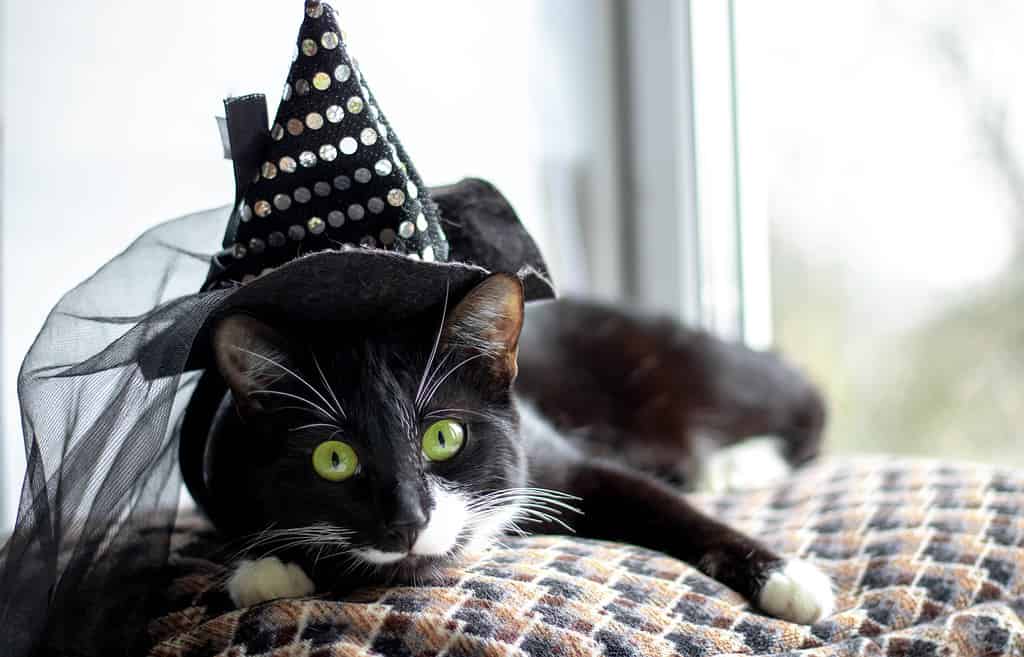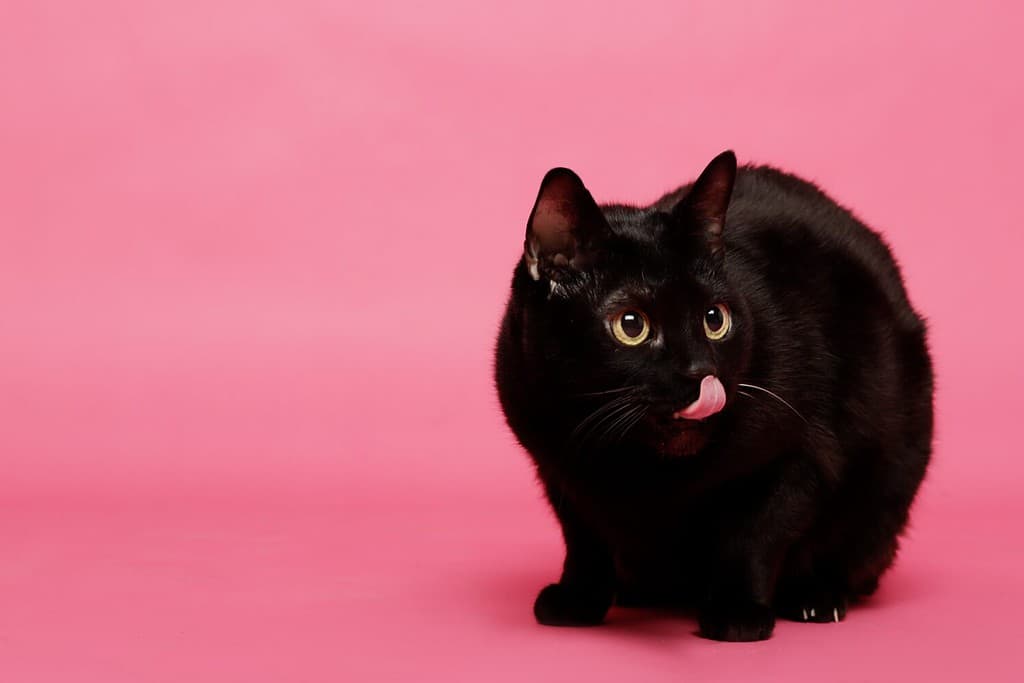Since the 13th century, many groups have associated black cats with evil. This belief has snowballed into deeper superstitions, fueling the narrative that black cats are bad luck. The concept ran rampant among various religions and cultures, going so far that some people even targeted and murdered innocent black cats in fits of fear and paranoia.
While the myth of black cats bringing bad luck has been debunked and lessened throughout the years, many still avoid adopting black cats to this day. In fact, black cats have the lowest rate of adoption (10%) of any coat color, according to research on cat coat color and cat outcomes in an urban U.S. shelter. Unfortunately, as a result of low adoption rates, they also have the highest rate of euthanasia (74.6%). While their association with bad luck might not be the driving force behind these statistics, the superstition certainly doesn’t help their case.
But where did these superstitions even stem from — and why are they still so prevalent and impactful today? Here’s why black cats are considered bad luck and how you can help shift this narrative.
History and Origin of Black Cat Superstitions
Seeing the number 13, walking under a ladder, breaking a mirror, opening an umbrella inside, and encountering a black cat — all of these share a commonality: apparent bad luck. While there’s no scientific evidence that any of the previously mentioned symbols or occurrences actually bring misfortune, many people still hold the superstitions in high regard, avoiding potential “bad luck” at all costs.

Black cats are often associated with witches.
©Lubov/ via Getty Images
Specifically, the idea that black cats are bad luck originated as early as the 13th century. Around that time, the Catholic Church claimed black cats were the incarnates of Satan. From there, other religions and cultures created their own superstitions of black cats. Generally, people linked these sophisticated felines to the devil, witches, or other forms of “evil.” This is where their association with bad luck stemmed from. If a black cat crosses your path, some people will still claim this is an evil spirit paying you a visit.
However, this concept wasn’t true for everyone. In fact, some cultures actually viewed black cats as good luck. For instance, in Japan, many believe you’ll experience good luck if a black cat crosses your path. Additionally, ancient Egyptians once worshipped black cats for their poise, protection against bad energy, and ability to hunt.
5 Reasons Black Cats Are Considered Bad Luck
There are various reasons why black cats are considered bad luck. Here are a few specific anecdotes from the medieval ages and beyond.
1. Black Cats Were Associated With the Devil and Witches
As mentioned above, many cultures and religions linked black cats to evil entities like the devil or malicious “witches.” Some medieval theories claim that black cats have evil spirits, incarnates of demons, or — at the very least — companions of them.
When it comes to the idea of witches, however, you might notice how that declaration has progressed over the years. In the past, witches were deemed “evil,” practicing dark magic and casting harmful spells. However, as evidenced by the Salem Witch Trials, many of the alleged “witches” were innocent women.
These devastating killings taught us just how powerful and dangerous superstitions can be. The witch trials all started because of one ill individual’s single claim of bewitchment (when, in reality, it was likely she was suffering from the fungus ergot, which can cause delusions and muscle spasms, among other symptoms). Such superstitions can cause paranoia and fear so strong that it drives some to kill in order to “protect” themselves and others. This was the case for black cats during the Bubonic plague (more on that below).
2. Many Blamed Black Cats for Spreading the Plague
During the Middle Ages, the Bubonic plague was rampant. Caused by the bacteria Yersinia pestis, which is typically found in small mammals or fleas, the plague became a life-threatening issue. Also called the “Black Death,” the plague killed more than one-third of Europe — 25 million people.
When the plague was at its worst, many people were struggling to find a solution. Because of their association with evil, black cats became a prime target. Some people began to blame black cats for the spread of the plague, going as far as killing them in an attempt to protect themselves and other humans. At this time, it was already common for people to kill black cats for a variety of other reasons. While this was intended to stop the spread of the plague, killing black cats actually had the opposite effect. In fact, it deduced the number of cats who could control the rodent population — the real culprit fueling the disease’s spread.

Though many negative superstitions involve black cats, they are beautiful, loving creatures like any other cat.
©DondykRiga/Shutterstock.com
Not only did cats not contribute to the spread of the plague, but they also are known to be the healthiest cats of all coat colors. According to research, the gene that gives black cats their color actually protects them against common cat diseases (specifically feline immunodeficiency virus).
Today, some people associate black cats with health and healing. However, because of these medieval claims, others still believe they bring bad luck, poor health, and misfortune.
3. They’ve Been a Symbol of Halloween
For quite some time, many people have associated black cats with Halloween. This might be in part due to their other associations with witches, the devil, and black magic. The history of black cat superstitions fuels the black cat’s “spooky vibe,” thus furthering the idea that these feline companions are bad luck. However, just because the gorgeous feline carries an eerie aura doesn’t mean the cat is bad luck.
4. They Have an Air of Mystery
Simply admiring a black cat, you will likely notice they carry an air of mystery. Maybe this is because of their dark associations, slick nature, or polished appearance. Whatever the case, according to many myths and legends, black cats are mysterious creatures. To some, this supports the idea that they’re bad luck. Often, when someone is mysterious, meaning they’re “strange” or “different” from the “norm,” people will create labels in an attempt to understand them better. This is likely, in part, why black cats have a negative association with bad luck. Black cats often get a bad reputation as a symbol of secrecy and with alleged ties to the spiritual realm.
5. They’re Thought to Bring Misfortune
Many people believe that if a black cat crosses your path, you will encounter many misfortunes. This superstition derived from the idea that cats were witches or the devil reincarnated. Thus, the idea is that if you come into contact with a black cat, you are actually being visited or haunted by an evil spirit.
Shift the Narrative: Black Cats Are Not Bad Luck
The superstition that black cats are bad luck has been harmful to these friendly felines for ages. In fact, as mentioned earlier, black cats have the lowest rate of adoption (10.0%) and the highest rate of euthanasia (74.6%) of any color. Many blame these devastating stats on the idea that black cats are bad luck — a myth that we should work to break as a society.
There are many reasons to adopt a black cat. These poised felines are beautiful, have great personalities, and can be loving companions. Just because superstitions paint black cats in a negative light doesn’t mean they’re bad luck. In fact, in many other cultures — and in my personal experience as a black cat owner — they’re actually good luck.
The photo featured at the top of this post is © NZ3/Shutterstock.com
Thank you for reading! Have some feedback for us? Contact the AZ Animals editorial team.







